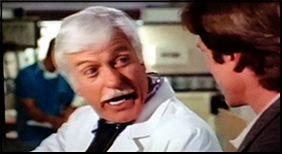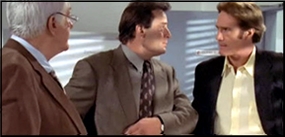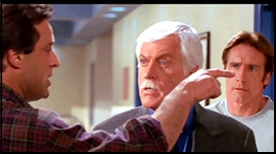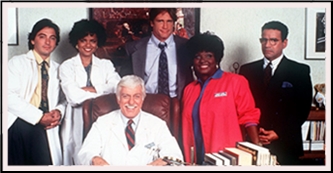Sun 28 Mar 2021
A TV Episode Review by David Friend: DIAGNOSIS MURDER “The Last Resort” (1998).
Posted by Steve under Reviews , TV mysteries[9] Comments

DIAGNOSIS MURDER. “The Last Resort.” CBS, original air-date: 19 November 1998 (Season 6, Episode 9). Dick Van Dyke (Dr. Mark Sloan), Victoria Rowell, Charlie Schlatter, Barry Van Dyke (Steve Sloan). Guest star: Joe Penny. Written by Paul Bishop. Director: Christian I. Nyby II. Series available on DVD. Not known to be currently streaming online.
I used to love Diagnosis Murder. When I was eleven and twelve years old, my mum would record (on VHS!) the daily afternoon repeat while I was busy enduring institutional betrayal at school. It may not have been the coolest television programme around, but it was light-hearted and often reasonably exciting, with a nifty mystery plot and maybe a bit of action too.
As I’m sure everybody here knows, the show revolved around ebullient sixty-something Dr Mark Sloan (Dick Van Dyke), the Chief of Internal Medicine at Community General Hospital in Los Angeles, who also doubles as an amateur sleuth and eventual consultant for the L.A.P.D., often working alongside his homicide detective son Steve (a permanently purse-lipped Barry Van Dyke, Dick’s real-life son).

Assisting Mark are a couple of young, attractive medical colleagues, sensible and assertive Dr Amanda Bentley (Victoria Rowell) and boyishly enthusiastic Dr Jessie Travis (Charlie Schlatter), though all three are often hindered by the fussy, fulminating hospital administrator Norman Briggs (Michael Tucci), who believes they should remain focused on their patients instead of trying to solve crimes.
The series depended almost disproportionately on its star and the good-will he had accrued from his eponymous sitcom and triptych of big-screen musicals from the early-to-mid 1960s. Like Andy Griffith, that other wholesome ’60s comedy lead who turned to the less demanding mystery genre in old age, Van Dyke was able to carve out a niche, catering to a more mature audience and working as a sort of counter-programming to gritty police procedurals like NYPD Blue and Homicide: Life on the Street.

Stylistically, it was a less twee and ever so slightly more plausible Murder, She Wrote, without ever becoming a similarly solid ratings champion. Indeed, Diagnosis Murder sputtered every year into almost reluctant renewals by a higher-brass who knew how appealing the older demographic was to advertisers compared to the younger, more impecunious generations proceeding them.
Whereas many episodes had a minor, frivolous subplot to offset all the murder and petty revenge, there was a small shake-up in the sixth season when things occasionally became a little bit darker than regular viewers might ordinarily expect. “The Last Resort” was one such episode, and there’s nary a chuckle to be had in its forty-four minutes, beginning with Steve apparently losing his professional perspective and attacking a suspect during interrogation – even throwing a chair through the one-way glass.
The sudden meltdown, after five years of watching this wearily workmanlike detective harrumphing his way through a slew of homicide investigations, is surprising, particularly as we’re told that he was supposed to be a calming influence on his new partner Reggie.

An abrasive, confrontational cop, Reggie Ackroyd (Joe Penny) is constantly on the brink of getting fired or even arrested himself, only justifying his erratic behavior with the dubious assertion that his wife and daughter were kidnapped by a criminal named Sykes. Things get even worse for the pair when Steve inadvertently kills an unarmed rapist and reluctantly allows Reggie to cover it up.
After further trouble, the men are strong-armed into attending a psychiatric rehabilitation program at Community General Hospital – a “Betty Ford clinic, except it’s for cops†– and struggle through sessions of group therapy led by the bluntly incisive Dr Sinclair (Reginald Val Johnson).
While Steve is weighed down by guilt of the cover-up, Reggie begins losing all sense of reality, the frustration and anger over his family’s supposed capture uncoiling into a series of vividly disturbing hallucinations.
Will he find them? Or is there something even more sinister going on?

A dark story, with one of its biggest surprises being the absence of a breezy tag-scene which typically closes every episode, and the decision to let its grimly unsettling final fade-out stew in the viewer’s mind. Joe Penny, formerly of the now almost-forgotten Jake and the Fatman (a series which originated the Mark Sloan character in a one-episode guest turn, though Penny plays another role here), is excellent as the cold and mercurial Ackroyd, a man driven to insanity from rage, remorse and the pressures of a police career.
To my eyes, at least, he looks like Sylvester Stallone, with a similar, moodily masculine persona to match. Barry Van Dyke, meanwhile, is subtly effective, though mostly this is due to the unexpected novelty of a more personal plot-line for the character rather than a genuinely compelling performance.
Elsewhere in the episode, there’s a more conventional mystery sub-plot which keeps the other two regulars occupied as they investigate the locked room murder of a lab technician. For once, Jessie confront the culprit, and in a slyly charismatic manner too, demonstrating how a puppy-ish medical prodigy can lull any criminal into a false sense of security.

March 28th, 2021 at 2:01 pm
Joe Penny first came to fame as part of the series Riptide, with Perry King. always liked him, but he had a tendency to yo yo in weight, which makes watching him weird, as he doesn’t look the same from episode to episode.
I feel like Barry Van Dyke could have been a big deal, if they still had 60’s style westerns on television.
March 28th, 2021 at 4:29 pm
Good review of one of those series I could never get into despite liking everyone involved. In fairness I couldn’t watch MURDER SHE WROTE or MATLOCK either though I liked the cast of all of them.
March 28th, 2021 at 4:56 pm
Barry Van Dyke made for a believable cop, in that he was bland, dour, and could handle the (very) occasional fight scenes. But he was a hunk in a town full of them, with little to distinguish himself from the pack.
Though his features seemed as chiselled as a stick of chalk, he didn’t necessarily have the good looks of, say, David Hasselhoff, Lee Majors and Richard Dean Anderson, or the genial, everyman appeal of James Garner and Tom Selleck, all of whom had occupied similar roles in previous years.
As an actor, he was always either crimping his mouth or just letting his jaw hang, regardless of the scene. But as a “type”, the somewhat generic cop who could move plausibly through crime stories, he was quite adequate.
March 28th, 2021 at 5:27 pm
For some reason, and this is totally unfair to him, I have always had the idea that Barry Van Dyke was only on TV shows his dad was on. Not so, not so. He’s had guest shots on almost every kind of series you can think of, and has done movies, too — with two as recently as 2019.
March 28th, 2021 at 5:34 pm
He’s had a fair few credits, yes, but they’re rare and unremarkable. Though I don’t mean to put him down or anything. With the amount of actors in Hollywood, it’s a wonder any one person can make a living.
March 28th, 2021 at 8:38 pm
You didn’t mean to put him down? That’s what you did do, and I agree with that assessment, but I do not care for his father at all either. On the other hand, Jerry Van Dyke works wonders for me. So there.
Now about a town full of actors; working actors are not the same as the other ninety percent. And a few jobs, with what is paid these days, works wonders.
March 29th, 2021 at 4:44 am
I was trying to be balanced 🙂
He was fine. Not wooden like some actors, and neither was he the only one out there with a narrow range. It did the job.
March 29th, 2021 at 7:00 am
Anyone who “doesn’t care for” Dick Van Dyke, as Barry Lane above, has clearly never seen his amazing work in THE MORNING AFTER (1974), a TV film where he plays an executive who is also a hopeless drunk (this shortly after Van Dyke came out about his own alcoholism). The last scene remains with me nearly 50 years later. He was nominated for an Emmy Award for the performance (he lost to Hal Holbrook), deservedly.
As for Diagnosis Murder, I never watched it.
April 1st, 2021 at 10:50 am
Jeff, just for further perspective, I don’t care about drunks or druggies either. You never watched Diagnosis Murder, which is a fine intelligent thing to do. I have made it a point of honor to never watch Van Dyke. So there you are.